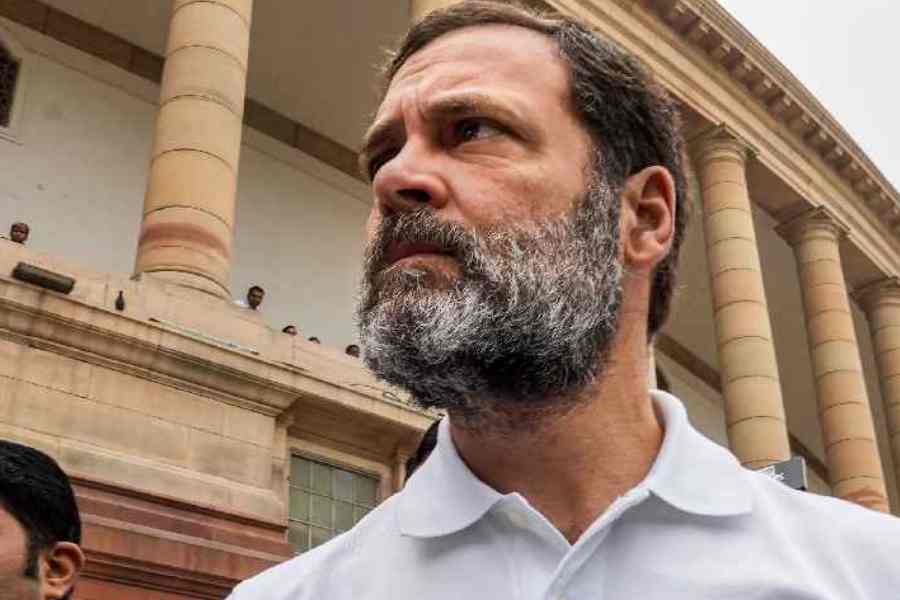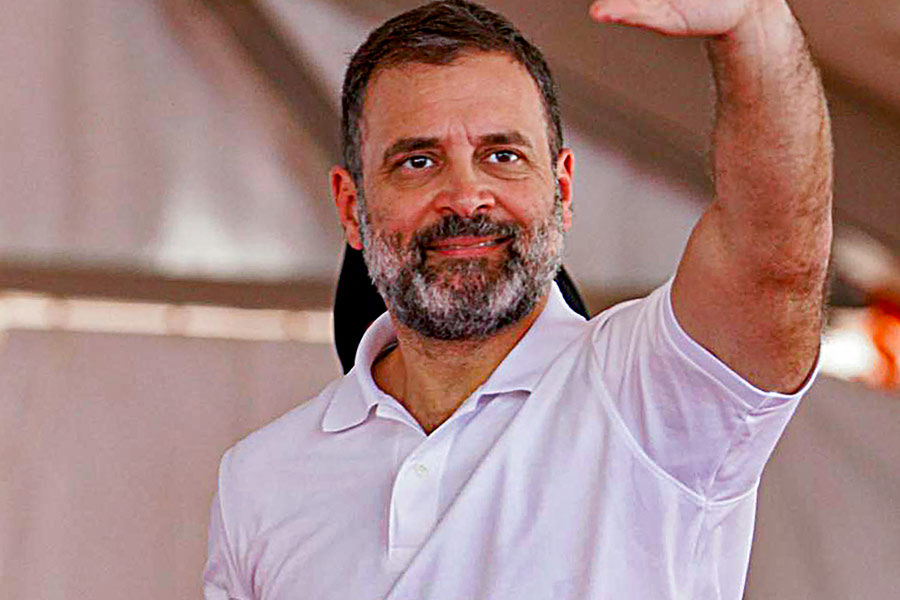Soon after Rahul Gandhi had taunted Prime Minister Narendra Modi for treating the inauguration of the new Parliament as a coronation, images of the brutal repression of the protesting wrestlers compelled him to tweet again: “Coronation is over. The arrogant king is now crushing the people’s voice on the streets.”
Hours before the police crackdown on women wrestlers who were protesting against alleged sexual exploitation by BJP MP and wrestling federation chief Brij Bhushan Sharan Singh, the Sangh parivar ecosystem and Modi had woven an impression that the sengol (sceptre) would now guide the government to rule with morality and judiciousness.
But the visuals from the streets punctured the lofty rhetoric that echoed in the majestic building where the coronation-like ceremony was conducted.
The Opposition saw the police brutality as vindication of its stand that democracy was in peril and that Modi was trying to blur that reality with the razzmatazz around the new Parliament building.
Congress president Mallikarjun Kharge said: “First he snatched the right of the President to inaugurate the new Parliament and then unleashed the tanashahi force on the streets to assault sportswomen. The three lies of RSS-BJP rulers lie unmasked before the nation: 1. Democracy 2. Nationalism 3. Beti Bachao.”
Kharge warned: “Modi ji remember, democracy is about people’s voices, not buildings.”
The major Opposition parties that boycotted Sunday’s function have been vigorously rubbing the message in that Modi is undermining democratic freedom as part of a sinister plan while chanting about India being the mother of democracy. The boycott emanated from his undemocratic politics and not merely from the question of constitutional propriety.
Contradictions emerged from the flawed position Modi was operating from. He described the new Parliament as a break with the slavish mindset as the old building was a colonial legacy but chose to inaugurate it on a Sunday only because it was the birth anniversary of Hindutva icon V.D. Savarkar. Ministers and BJP leaders started the day by offering flowers in tribute to Savarkar in the Parliament building.
Ironically, Savarkar was not only an accused in the Gandhi assassination case and faced trial along with Nathuram Godse, but he also wrote several mercy petitions to ensure his personal freedom, going to the extent of promising to serve British interests.
“Where else can the prodigal son return but to the parental doors of the Government?” he wrote, while freedom fighters were willingly embracing the death sentence or rotting in jail. The slavish mindset that Modi referred to will continue to haunt the new Parliament if Savarkar gets attached to its history.
The Opposition parties have demonstrated the courage to stick to their conviction despite the outcry in the electronic media about disrespecting national sentiment as Parliament doesn’t belong to the government.
Congress communications chief Jairam Ramesh explained the significance of May 28 by saying: “On this day: 1. Nehru, the person who did the most to nurture parliamentary democracy in India, was cremated in 1964. 2. Savarkar, the person whose ideological ecosystem led to the killing of Mahatma Gandhi, was born in 1883. 3. The President — the first Adivasi to become President — is not allowed to fulfil her Constitutional duties and inaugurate the new Parliament building in 2023. 4. A self-glorifying authoritarian Prime Minister with utter disdain for parliamentary procedures, who rarely attends Parliament or engages in it, inaugurates the new Parliament building in 2023. 5. Fabrication of facts by Distorians (those who distort history) and the drum-beating of the media hit new lows in 2023.”
The Congress also saw an “anti-backward mindset” in Modi’s decision to prevent the tribal President from inaugurating the new building.
The party general secretary in charge of the organisation, K.C. Venugopal, tweeted: “At the foundation stone laying ceremony of the new Parliament building, then President Ramnath Kovind was kept away from the ceremony. At its inauguration, President Droupadi Murmu has been sidelined. It is the upper caste, anti-backward mindset of the RSS because of which they are denied the respect that their high constitutional office deserves.”
Venugopal argued that their deliberate exclusion shows Modi will use them as tokens for his electoral politics, but not allow them to be part of such significant and historic occasions. While Kovind is a Dalit, Murmu is an Adivasi. The BJP hyped up their identity for political gains, creating a narrative that it cared for the empowerment of the most downtrodden. However, neither of them was allowed to do the honours of laying the foundation stone and finally inaugurating the building.
Deputy chairperson of Rajya Sabha Harivansh read out messages from President Murmu and Vice-President Jagdeep Dhankar. Their physical presence at the ceremony would have made it difficult for the Prime Minister to preside over the function. Messages from both included one sentence — that they were happy the Prime Minister was inaugurating the building — in an apparent attempt to lessen Modi’s sense of guilt.
NCP veteran Sharad Pawar, who has seen Parliament for decades, expressed sadness at the heavy dose of religiosity at the function. He said: “I watched the ceremony on TV. I am happy I was not present there. Jawaharlal Nehru had a scientific mindset, he had a vision for the country. But I felt the country was being dragged backwards.”
Pawar also expressed shock at the absence of the President and Vice- President who are an integral part of Parliament.
Rashtriya Janata Dal MP Manoj Jha, who argued that the political culture and its democratic institutions were being emptied of their potential to inspire and lead, said the new Parliament had come at a time the space for discussion had shrunk. Commenting on the images of priests handing over the sengol to Modi, he wondered if the Prime Minister was happy with the fulfilment of his dream to drag Indian democracy towards monarchy.
Posting a video of the Sengol handover that was overloaded with religiosity, the anguished RJD member tweeted: “Dear Bapu, Nehru, Patel, Azad, Baba Saheb… good that you saved us Indians from these images. This is a living document of the sickness of our contemporary democracy. Dear freedom fighters, your country has fallen sick.”











